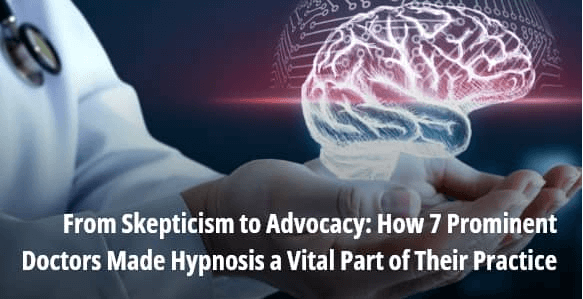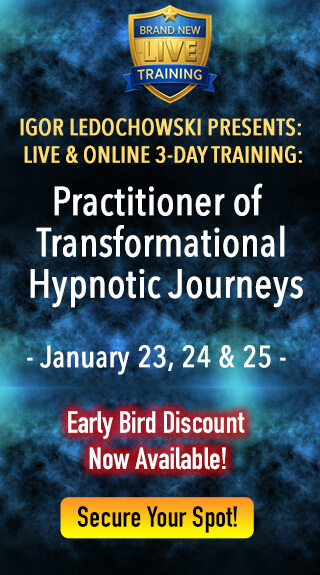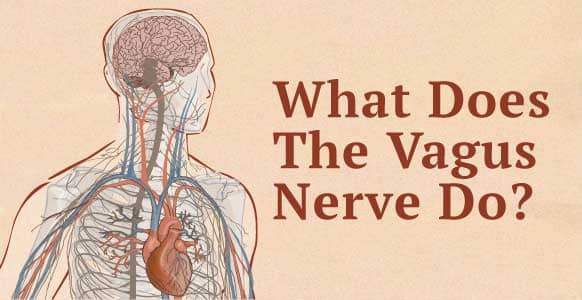
If you know anything about hypnosis, you’ll probably realize this.
It’s one of the best methods available to help somebody change the way they think and the way they behave.
Hypnosis helps you switch off from the everyday conscious world so you can go inside and communicate with your unconscious.
That’s the part of your mind that makes real change possible.
It controls your thoughts, your emotions, your memories, and much more.
Tap into that, and you can achieve anything.
In one sense, hypnosis and OCD were meant for each other.
Why? Because hypnosis can help a client suffering from OCD to stay calm and relaxed, to find other ways to cope with their anxiety and distress.
The reason why hypnosis is so good at doing that is simple.
It’s a powerful technique that changes the way you respond to stress and anxiety.
It puts you back in control of your life by literally helping you to reprogram your brain.
But before finding out how hypnosis can do that, let’s delve into the nature of OCD a little bit more.
What Is OCD & Why Should It Be Treated?
According to the folks at WebMD, obsessive-compulsive disorder (OCD) is a mental illness that leads to repeated unwanted thoughts (obsessions) or repeated behaviors (compulsions).
It doesn’t refer to common bad habits like nail-biting or having negative thoughts. An obsession is usually an unpleasant thought, image or urge that keeps entering your mind, making you anxious or uneasy.
A compulsion is a behavior or action that you feel you have to carry out to relieve the anxiety or uneasiness brought on by the obsession.
For example, if someone with OCD imagines that their hands are dirty (obsession), they’ll feel the need to scrub them over and over (compulsion) until they believe them to be clean again.
Having the same thoughts or habits is perfectly normal for most people. But if you have OCD, those thoughts or actions:
- Are beyond your control
- Are unpleasant
- Take up hours of your time
- Can interfere with your work and home life
OCD often appears in teens and young adults, and is more common in women than in men. You may be more at risk of developing the illness if:
- A close relative suffers from it
- You experience depression, anxiety or tics
- You’ve been exposed to some form of trauma
- You’ve experienced physical or sexual abuse as a child
Obsessive thoughts are often associated with worry, and stress can make the symptoms worse. Someone worried about their house being burgled, for example, might spend hours checking and rechecking that all the doors and windows are locked and secure before being able to go to bed at night.
Left untreated, the condition can get so bad that the person is unable to function – and can even become suicidal. It’s estimated that as many as 1% of OCD sufferers die by suicide.
An article on the Beyond OCD website states that getting effective treatment can help provide relief from the symptoms and give sufferers back control of their lives.
But what kind of treatment should that be?

Why Hypnotherapy Can Help Those With OCD
One of the main symptoms associated with OCD is anxiety, which is a type of fear that gets worse when you feel stressed.
So if you’re feeling stressed, afraid and anxious, it’s impossible for you to relax. On the other hand, if you’re feeling relaxed, it’s impossible for you to feel stressed.
That’s what a deep hypnotic trance can do. It helps you to shut out the outside world, to leave your cares behind so you can experience profound relaxation.
And when you’re that relaxed, your worries simply melt away.
So hypnosis or hypnotherapy is a powerful technique for dealing with or relieving anxiety. It actually changes the way you respond to stress and anxiety so you can manage the physical and emotional effects more effectively.
Take OCD as an example. This illness often shows up in the form of obsessive thoughts or compulsive behaviors, and sometimes both.
These thoughts or behaviors can be genetic, the result of damaged or malfunctioning neural pathways, or caused by emotional or developmental issues. But whatever the cause might be, hypnosis offers an effective way to treat it.
Why? Because hypnosis gives you the power to bypass the conscious mind so you can communicate with the unconscious. Once you do that, you’re able to reprogram the way you think and the way you behave.
The unconscious is like the “problem solving” part of your brain. That’s why the longer you think about a problem, the more likely it is that the solution will eventually pop into your head.
Your unconscious mind literally “finds” the answer for you. It stores all your memories and all the resources you’ve used to make it to this stage in your life.
And hypnosis is the perfect tool to tap into and access those resources.
But what specific hypnosis techniques might you take advantage of?

Hypnosis And OCD: How To Help OCD Sufferers
Can hypnosis help with OCD? Yes, it most certainly can.
Check out What Can Hypnosis Help Treat article to get an idea of the many other issues that can be treated successfully using the power of hypnosis.
There are lots of hypnosis techniques that can be employed to help people deal with and even eliminate their OCD.
First up is Conversational Hypnosis. This involves the hypnotherapist simply having a conversation with the subject, during which they pass on subtle suggestions that help the subject take a certain action.
These subtle hypnotic cues can help someone see a problem in a different light. Where OCD is concerned, it can give them the resources they need to manage their anxiety levels effectively.
Another technique is Regression Therapy. This involves taking the subject back to a time in their life before the OCD began.
For example, it might have started when they were a child. The regression will take them back to their childhood days so they can identify the cause that triggered the OCD, and then help them realize that the cause or situation no longer exists.
The next technique involves the PCAT Formula. This is a 4-part technique you might think of as ready-made stress and anxiety buster. Here’s how it works.
1. P stands for Problem. Talking about the problem brings it out into the open. As soon as you start talking about it, the nerve cells in your brain start making connections and begin looking for a solution.
2. C stands for Bypass the Critical Conscious Mind. The idea is to interrupt your thinking patterns because as long as you keep thinking in the same way, your situation won’t change. You do that by getting the subject relaxed and using hypnotic language (such as mind-bending language) to shut off the conscious mind and get at the unconscious mind.
3. A stands for Access the Resources. Everyone has their own inner resources that hypnosis can help tap into. As soon as the problem is made known, your unconscious starts looking for the solution. Hypnosis helps you visualize different ways of doing things, find new ways to react, or relive past experiences when you were able to cope with stress and anxiety. And the next time you feel stressed or anxious, you can use those resources to manage it more effectively.
4. T stands for Transform the Problem. Once you have access to a few solutions, then you can take the appropriate action. They’ll open your mind so you can put things in perspective and start focusing on the positive rather than the negative.
The truth is that OCD is a complex disorder. So even when you identify the triggers, that’s not enough to change the behavior.
According to Wellness Institute, that’s because the behavior is “deeply embedded in the subconscious mind.” Hypnosis helps the sufferer relax, removing the anxiety so they can examine their thoughts and behaviors objectively.
This enables them to identify their OCD without identifying with it. Once this form of separation occurs, the hypnotherapist might do some ego-strengthening to help the subject feel better about himself or herself.
There are many ways to use hypnosis for obsessions and compulsions. Hypnotist Matthew Tweedie explains its benefits like this:
- Hypnosis “opens the door” to the unconscious mind
- Hypnotherapy lets you replace negative thinking with positive thinking
- Hypnosis allows you to get at the root of the problem and use your own inner resources to find solutions

But why use hypnosis when you could take medication instead?
Medication can take weeks to kick in, can alter your body’s internal processes, and might have significant side-effects. And no matter what medication you take, the effects are short-term and only last as long as you’re taking it.
Hypnosis works fast, is non-invasive and is perfectly safe. And a skilled therapist can help you get rid of your OCD for good.
If you suffer from OCD or know someone who does, hypnosis could be the answer you’ve been looking for. It literally rewires your brain from the inside out, giving you the chance to be free from worry and to take back control of your life once and for all.
>>Related Article: What Can Hypnosis Help Treat? 16 Common Issues Resolved By Going Into A Hypnotic Trance (PLUS Scientific Studies To Back It Up)
Conclusion & Key Takeaways
Hypnosis is a powerful and effective technique for overcoming OCD.
Using hypnosis, it’s possible to tap into the unconscious mind and access the resources you need to take back control of your life.
OCD stands for obsessive-compulsive disorder, a mental illness that forces sufferers to repeat unwanted thoughts or behaviors. It often appears in teens and young adults.
These thoughts or behaviors are time-consuming, unpleasant and beyond your control.
Obsessive thoughts are often associated with worry, and if left untreated, the condition can make it impossible to function normally. Getting effective treatment is the only way to obtain relief from the condition.
One of the best forms of treatment is hypnosis, for two reasons:
1. It helps promote deep relaxation, and you can’t be stressed or worried when you’re feeling relaxed
2. It lets you tap into your unconscious mind, the “problem solving” part of your brain, to find practical solutions
There are several hypnosis techniques that are ideal for helping someone manage and even eliminate their OCD. These include:
- Conversational Hypnosis – using conversation-style hypnotic language to implant subtle suggestions in the unconscious mind
- Regression Therapy – taking someone back to when the OCD started, to recognize that what triggered it is in the past
- The PCAT Formula – a 4-part hypnosis method for identifying problems, finding solutions and taking appropriate action
Hypnosis makes it possible to shut out the conscious everyday world and focus your thoughts inward. It opens the door to the unconscious mind so you can get at the root of the problem and find the resources you need to overcome it.
Unlike medication, hypnosis is non-invasive, non-addictive and completely safe. It’s also one of the quickest ways to overcome OCD so you can take back control of your life.









![[ADVANCED GUIDE] How To Master Hypnotic Regression Therapy - Part I: Essential Principles To Profoundly Transform Your Subject’s Emotional Trauma [ADVANCED GUIDE] How To Master Hypnotic Regression Therapy - Part I: Essential Principles To Profoundly Transform Your Subject’s Emotional Trauma](https://hypnosistrainingacademy.com/wp-content/uploads/2016/09/hypnotic-regression-therapy-essential-principles.jpg)



